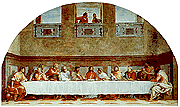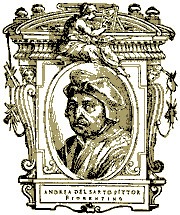Painter
Florence (1486-1530)
The son of Agnolo di Francesco, a tailor, he was the last great classical
painter in Florence (1486-1530), before the birth of Mannerism.
The pupil of Piero di Cosimo, he was influenced by Leonardo da Vinci and Raphael
and was a purely classical painter. According to Vasari,
he could draw "perfectly"
and combined Roman formalism and Leonardo's soft shading with
the luminous colours of the Veneto region, thus showing his interest
in research and the doubts that were to lead to Mannerism. It
is hardly a surprise to find that Pontormo, Rosso and Giorgio Vasari studied
in his workshop.
He carried out more than one series of frescoes: he painted scenes from the life
of St. Filippo Benizzi (1510) in the Cloister dei Voti in the Annunziata ,
and, after two probable trips to Rome, scenes from the Life of Mary (1514 c.)
and the lunette of the Madonna of the Bag (1525), one of his finest works.
His grisaille of the Life of St. John the Baptist in the Chiostro
dello Scalzo, is also an extremely fine work (from 1515). He also painted
the Tribute to Caesar in the Medici villa of Poggio a Caiano but one of his most
important works is certainly the Last Supper at San Salvi (carried out between
1520-25, even though the contract is dated 1511). It was described as being the
only
"Last Supper" that was not cancelled out by the famous
one by Leonardo.

Last Supper Cenacolo St.Salvi.
His many panels on wood, where he best expresses his delicate use of colour,
include the Madonna of the Harpies (Uffizi), the Dispute of the Holy Trinity,
the Deposition and the Dream of the Pharoah (all in the Pitti
Palace), the Sacrifice of Abraham (Madrid, Prado) and the Portrait of
Sansovino (1524) in the National Gallery in London.
Towards the end of his life, saddened by the desertion of his wife and the loss
of many of his paintings during the siege of Florence, he lay down in his bed,
refused to eat and died within a short time.

